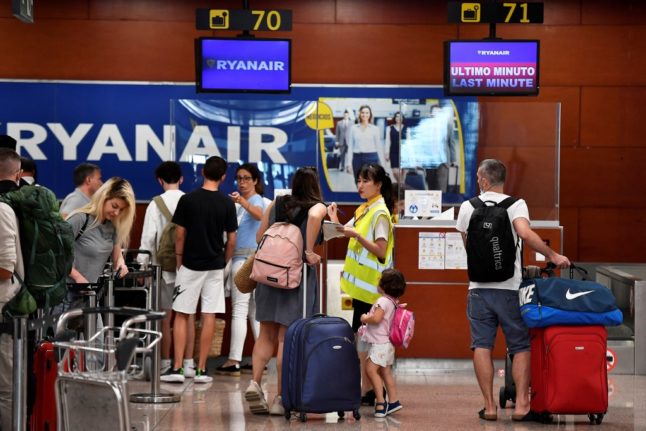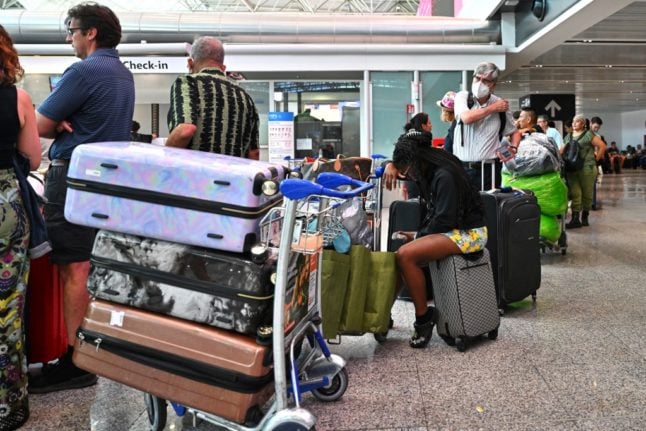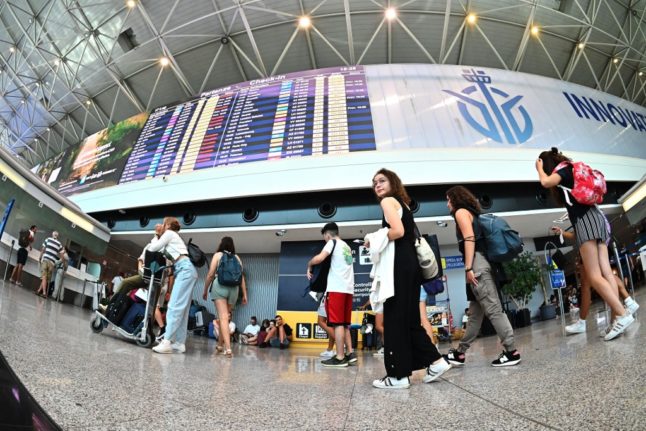Strikes and staff shortages have made air travel problematic across Europe since early June, but airports in some countries have been much more badly affected than others.
There are reports of ongoing serious disruption everywhere from Spain to Germany, with at least 15,700 flights already cancelled across the continent this month.
READ ALSO: Airport chaos in Europe: Airlines cancel 15,000 flights in August
Outside of Europe, more travel chaos has been reported in Australia this month, while passengers travelling to and from the UK have suffered months of disruption and cancellations.
Despite some limited strike action earlier in the summer season, Italian airports by contrast appear not to be badly affected.
Between June 20th and July 24th, some 3,600 flights from Italian airports were cancelled, or 1.8 percent of national flights and 3.6 percent of international flights, according to data from Italian national civil aviation agency, Enac.
The most cancellations (377) were recorded on July 17th, the date of Italy’s last transport strike.
Fewer Italian flights are likely to be cancelled in August, with no strikes planned. However, travel to and from the country hasn’t necessarily been a trouble-free experience for everyone this month.

“It’s clear that the Italian airport system has reacted differently to the difficulties, even if the recovery was sudden,” Enac president Pierluigi di Palma said in an interview with Italian national broadcaster Rai.
“I would say that we are mostly suffering the consequences of what’s happening in continental airports.”
The knock-on effect of flight cancellations and delays elsewhere has caused some disruption for passengers in Italy, while things are particularly busy this month as the number of people travelling to the country has shot up, exceeding 2019 levels.
Tania Davis, 41, travelled from London Heathrow to Venice with her two children in early August and tells The Local that while she found travelling from Heathrow “stressful and chaotic” everything was “fine” on the Italian side.
“We arrived very late at night because our flight was delayed by just over two hours, but once we got to Italy coming through arrivals and then getting our flight home a week later, everything went smoothly. I can’t fault the airport. It was as busy as you’d expect at this time of year but the lines moved quickly.”
READ ALSO: Airport chaos in Europe: What are your rights if flights are delayed or cancelled?
Some travellers reported facing long delays going both ways, for different reasons. Reader David and his wife flew from Manchester to Brindisi in late July and back again two weeks later.
“We made the mistake of arriving at Brindisi for our flight home three hours before flight time as we had done on the way out, advised by Ryanair,” he tells The Local.
“We sailed through security at Brindisi, no staffing issues there unlike in Manchester where it took 90 minutes to get through.
“But our flight was then delayed, by three hours in the end. Arriving early just meant we had to spend even more time waiting in departures,” he says.
“It’s a really small airport and every flight on the board was delayed, so we were packed in like sardines in this small space with no ventilation.”
“The pilot said our flight was late arriving due to missing an air traffic control slot at Manchester,” he adds.
Other than delays apparently caused by disruption across flight networks, there have been very few reports of problems such as long security queues and lost baggage at Italian airports.
The government warned Italian passengers last month to take hand baggage only when travelling – but this was due to concerns about luggage being lost at destination airports, not at those within Italy.

Italy has escaped the worst of the travel chaos “both for structural reasons and for the measures that the government has taken to limit the consequences of the pandemic”, writes Italian financial newspaper Il Sole 24 Ore.
Airport staff shortages are not a major problem in Italy, where “there are generally more worker protections and restrictions on dismissal than in other countries such as the United Kingdom,” Il Sole explains.
Italy was also the only EU country to ban layoffs amid the pandemic, Il Sole points out, with the government in 2020 forcing airline companies to keep their staff on even when flights were grounded.
This ban lasted until 2021, when it was replaced with financial incentives for companies that refrained from laying off staff.
Di Palma said the government’s interventions meant “we have been able to stem the haemorrhage of ground personnel that occurred at foreign companies during the pandemic, saving precious resources”.
READ ALSO: Italy’s summer tourism boom driven by American arrivals
While this is good news for passengers flying to and from Italy’s airports this summer, the ongoing situation across Europe means some disruption to travel plans remains likely.
The passengers we spoke to advised anyone flying this month to pack light, dress for comfort, and “lower your expectations”.
If your flight is cancelled or significantly delayed, you may be entitled to receive compensation from your airline. Find more information here.
Have you travelled to or from Italy in August? How did your experience compare to those featured in the article? Please leave a comment below to let us know.



 Please whitelist us to continue reading.
Please whitelist us to continue reading.
We travelled from JFK to Malpensa on 7/16 and had no issues on either side. Hoping for the
same on our return trip on 8/20.
I spent 5 weeks in Sicily at the beginning of April through to May. Because of the length of stay I decided to send a suitcase with my summer clothes ahead by courier. Despite declaring that there was nothing but clothing in my bag, customer decided to check for themselves. When they had finished instead of handing over the bag into the care of the courier they decided to deposit it in a warehouse in Malpensa. Almost 5 months later it is still there! Will it ever come home? I wonder despite frequent inquiries by the courier.